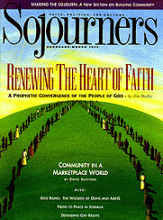A writer for Melody Maker once called Murmur, REM's 1983 debut album, "the blueprint for alternative rock in the '80s." A debatable statement, to be sure (and one that excludes The Replacements, arguably the most important group of the last decade), but also one with a kernel of truth. For more than 10 years, REM's songs have provided a sizable chunk of the soundtrack for a generation of people now creeping up on 30; and their influence over our lives looms large.
Just as the late music critic Lester Bangs once wrote that his generation (the Boomers) would never agree about anything as much as they did about Elvis, my generation (the twentysome-things) never agreed--and disagreed--about anything as much as we did and do about REM. Love 'em or hate 'em, for the last 10 years the Athens, Georgia quartet has been an Important Band.
Thus, the release of Automatic for the People, REM's 10th album, is something of an event. The LP was released right on the heels of their last effort, Out of Time, but the two discs couldn't be more disparate. Whereas Out of Time was something of a undertuned mess, Automatic for the People is virtually flawless, shimmering with the melody and passion that have been largely lacking in REM's recent work.
It's also a painfully somber record, awash in memory and loss. "Hey kids, rock and roll/Nobody tells you where to go," singer Mike Stipe croons on "Drive," the first single. He sounds like a middle-aged rebel without a cause landed in a rehab, lamenting old battles with bitter sarcasm. The pensive, stop-and-go chimes of Peter Buck's acoustic guitar ironically underscore the putative rebellion of the lyrics.
Read the Full Article

